Psychology and its Relationship to Health and Social Care: Report
VerifiedAdded on 2023/01/19
|10
|3518
|84
Report
AI Summary
This report examines the crucial link between psychology and the health and social care sectors. It begins by comparing theories of life span development and analyzing how psychological theories relate to different stages of human development. The report then delves into social and biological factors influencing human behavior, emphasizing the importance of social roles within health and social care settings. Furthermore, it applies psychological theories to individuals experiencing elevated stress levels, exploring how these theories relate to behavioral disturbances and mental disorders. The report also investigates how psychological principles can affect behavior change within health and social care, enhancing the understanding of relationships. Finally, it provides a comprehensive overview of the application of psychological theories in health and social care practices, making it a valuable resource for students and professionals alike.
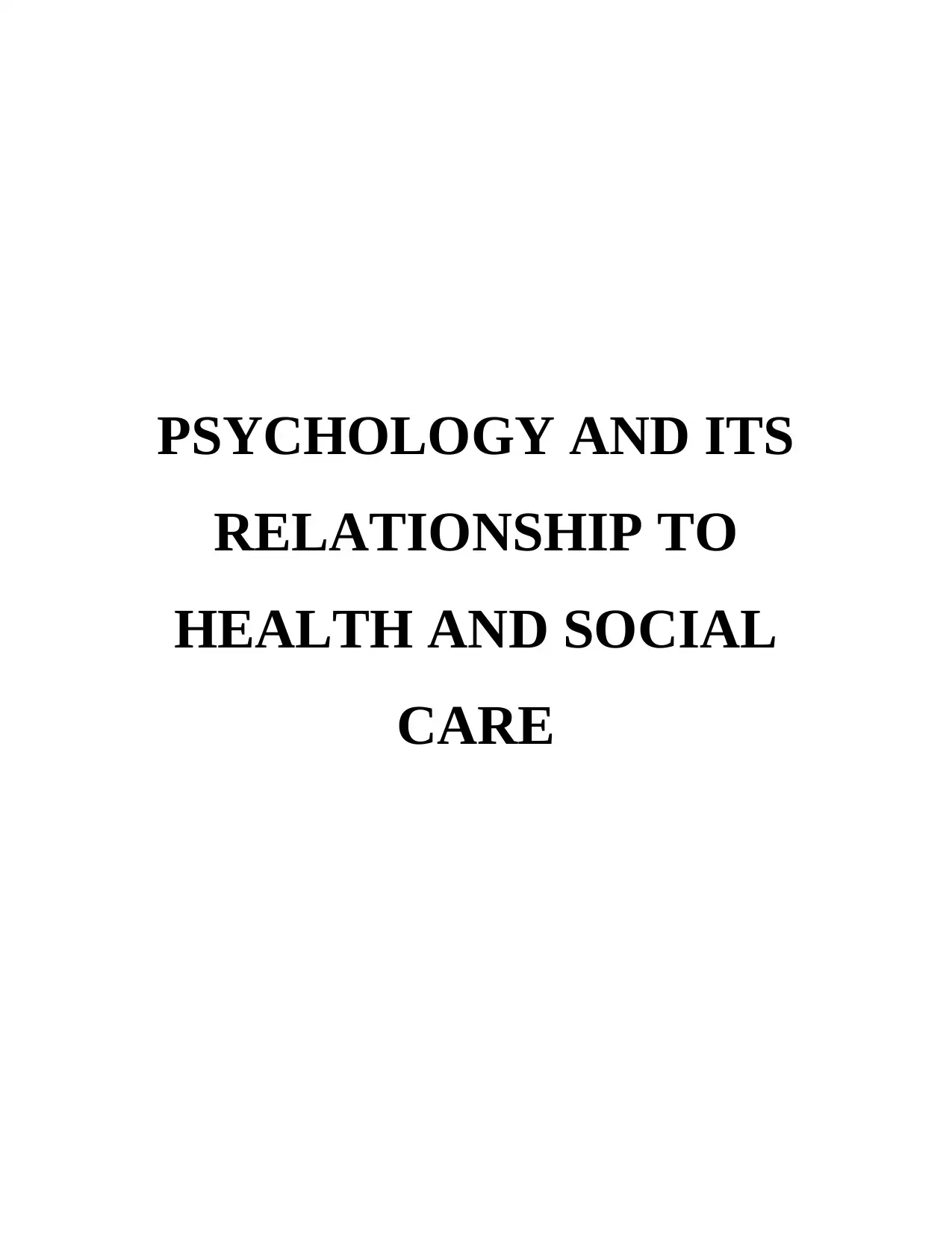
PSYCHOLOGY AND ITS
RELATIONSHIP TO
HEALTH AND SOCIAL
CARE
RELATIONSHIP TO
HEALTH AND SOCIAL
CARE
Paraphrase This Document
Need a fresh take? Get an instant paraphrase of this document with our AI Paraphraser
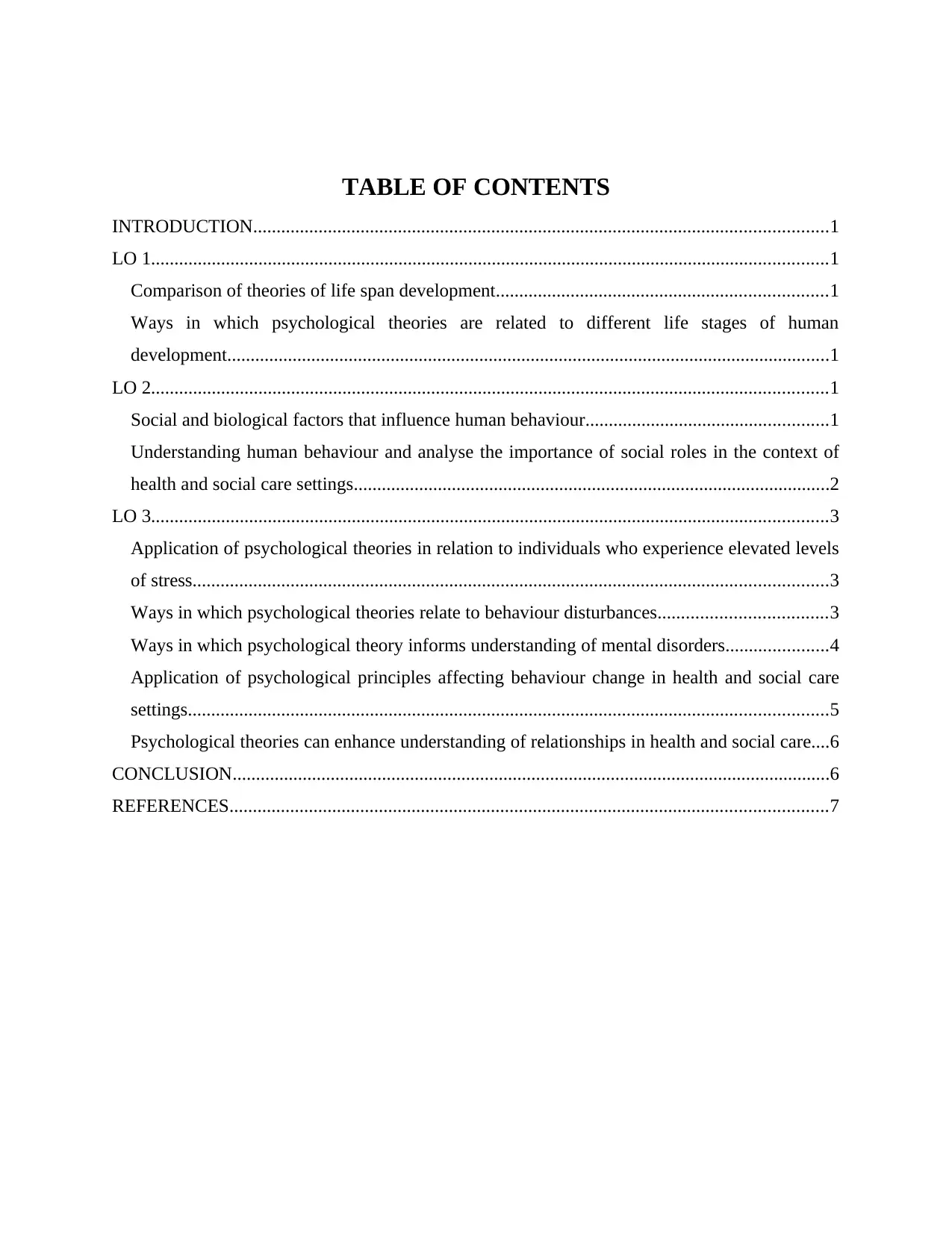
TABLE OF CONTENTS
INTRODUCTION...........................................................................................................................1
LO 1.................................................................................................................................................1
Comparison of theories of life span development.......................................................................1
Ways in which psychological theories are related to different life stages of human
development.................................................................................................................................1
LO 2.................................................................................................................................................1
Social and biological factors that influence human behaviour....................................................1
Understanding human behaviour and analyse the importance of social roles in the context of
health and social care settings......................................................................................................2
LO 3.................................................................................................................................................3
Application of psychological theories in relation to individuals who experience elevated levels
of stress........................................................................................................................................3
Ways in which psychological theories relate to behaviour disturbances....................................3
Ways in which psychological theory informs understanding of mental disorders......................4
Application of psychological principles affecting behaviour change in health and social care
settings.........................................................................................................................................5
Psychological theories can enhance understanding of relationships in health and social care....6
CONCLUSION................................................................................................................................6
REFERENCES................................................................................................................................7
INTRODUCTION...........................................................................................................................1
LO 1.................................................................................................................................................1
Comparison of theories of life span development.......................................................................1
Ways in which psychological theories are related to different life stages of human
development.................................................................................................................................1
LO 2.................................................................................................................................................1
Social and biological factors that influence human behaviour....................................................1
Understanding human behaviour and analyse the importance of social roles in the context of
health and social care settings......................................................................................................2
LO 3.................................................................................................................................................3
Application of psychological theories in relation to individuals who experience elevated levels
of stress........................................................................................................................................3
Ways in which psychological theories relate to behaviour disturbances....................................3
Ways in which psychological theory informs understanding of mental disorders......................4
Application of psychological principles affecting behaviour change in health and social care
settings.........................................................................................................................................5
Psychological theories can enhance understanding of relationships in health and social care....6
CONCLUSION................................................................................................................................6
REFERENCES................................................................................................................................7
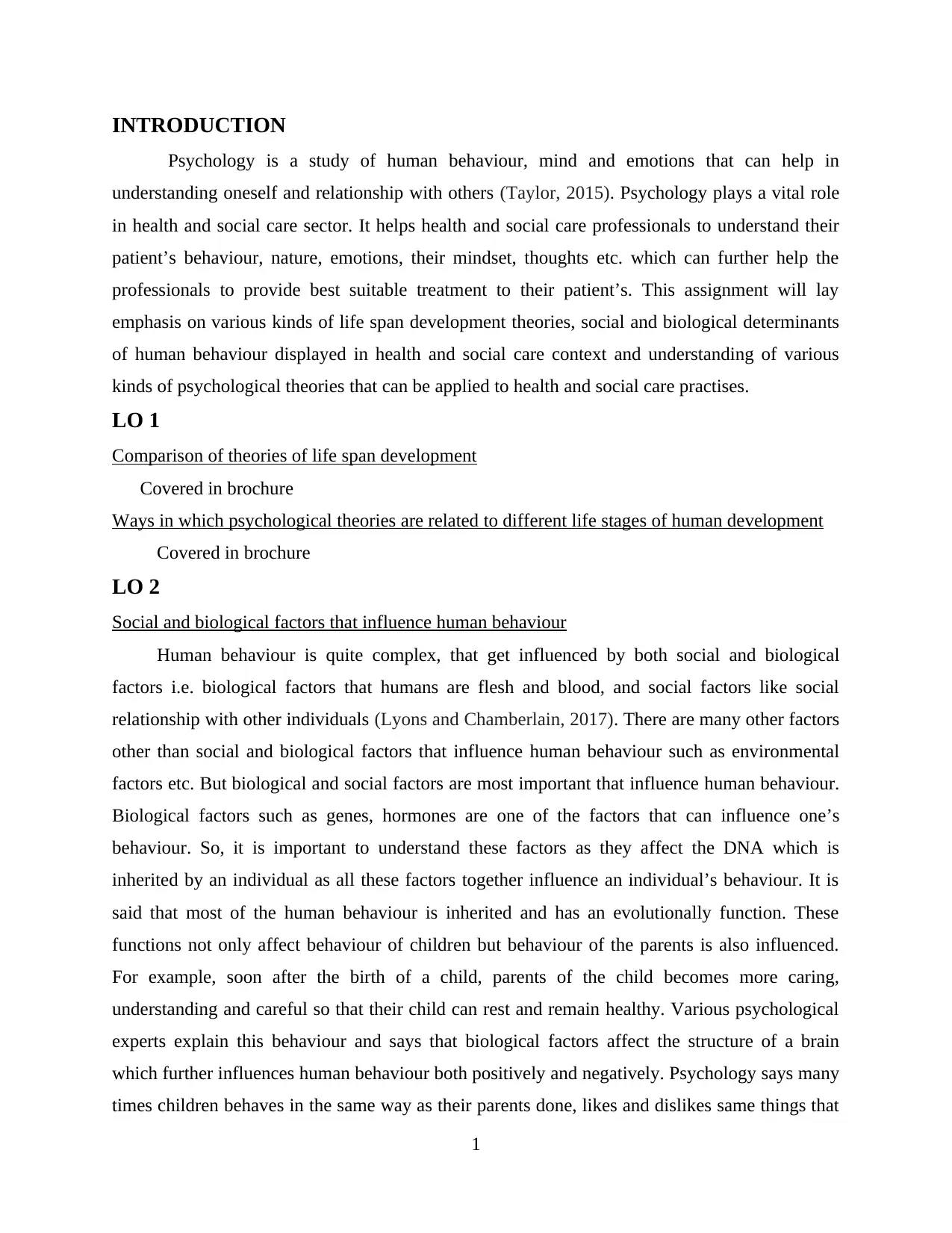
INTRODUCTION
Psychology is a study of human behaviour, mind and emotions that can help in
understanding oneself and relationship with others (Taylor, 2015). Psychology plays a vital role
in health and social care sector. It helps health and social care professionals to understand their
patient’s behaviour, nature, emotions, their mindset, thoughts etc. which can further help the
professionals to provide best suitable treatment to their patient’s. This assignment will lay
emphasis on various kinds of life span development theories, social and biological determinants
of human behaviour displayed in health and social care context and understanding of various
kinds of psychological theories that can be applied to health and social care practises.
LO 1
Comparison of theories of life span development
Covered in brochure
Ways in which psychological theories are related to different life stages of human development
Covered in brochure
LO 2
Social and biological factors that influence human behaviour
Human behaviour is quite complex, that get influenced by both social and biological
factors i.e. biological factors that humans are flesh and blood, and social factors like social
relationship with other individuals (Lyons and Chamberlain, 2017). There are many other factors
other than social and biological factors that influence human behaviour such as environmental
factors etc. But biological and social factors are most important that influence human behaviour.
Biological factors such as genes, hormones are one of the factors that can influence one’s
behaviour. So, it is important to understand these factors as they affect the DNA which is
inherited by an individual as all these factors together influence an individual’s behaviour. It is
said that most of the human behaviour is inherited and has an evolutionally function. These
functions not only affect behaviour of children but behaviour of the parents is also influenced.
For example, soon after the birth of a child, parents of the child becomes more caring,
understanding and careful so that their child can rest and remain healthy. Various psychological
experts explain this behaviour and says that biological factors affect the structure of a brain
which further influences human behaviour both positively and negatively. Psychology says many
times children behaves in the same way as their parents done, likes and dislikes same things that
1
Psychology is a study of human behaviour, mind and emotions that can help in
understanding oneself and relationship with others (Taylor, 2015). Psychology plays a vital role
in health and social care sector. It helps health and social care professionals to understand their
patient’s behaviour, nature, emotions, their mindset, thoughts etc. which can further help the
professionals to provide best suitable treatment to their patient’s. This assignment will lay
emphasis on various kinds of life span development theories, social and biological determinants
of human behaviour displayed in health and social care context and understanding of various
kinds of psychological theories that can be applied to health and social care practises.
LO 1
Comparison of theories of life span development
Covered in brochure
Ways in which psychological theories are related to different life stages of human development
Covered in brochure
LO 2
Social and biological factors that influence human behaviour
Human behaviour is quite complex, that get influenced by both social and biological
factors i.e. biological factors that humans are flesh and blood, and social factors like social
relationship with other individuals (Lyons and Chamberlain, 2017). There are many other factors
other than social and biological factors that influence human behaviour such as environmental
factors etc. But biological and social factors are most important that influence human behaviour.
Biological factors such as genes, hormones are one of the factors that can influence one’s
behaviour. So, it is important to understand these factors as they affect the DNA which is
inherited by an individual as all these factors together influence an individual’s behaviour. It is
said that most of the human behaviour is inherited and has an evolutionally function. These
functions not only affect behaviour of children but behaviour of the parents is also influenced.
For example, soon after the birth of a child, parents of the child becomes more caring,
understanding and careful so that their child can rest and remain healthy. Various psychological
experts explain this behaviour and says that biological factors affect the structure of a brain
which further influences human behaviour both positively and negatively. Psychology says many
times children behaves in the same way as their parents done, likes and dislikes same things that
1
⊘ This is a preview!⊘
Do you want full access?
Subscribe today to unlock all pages.

Trusted by 1+ million students worldwide
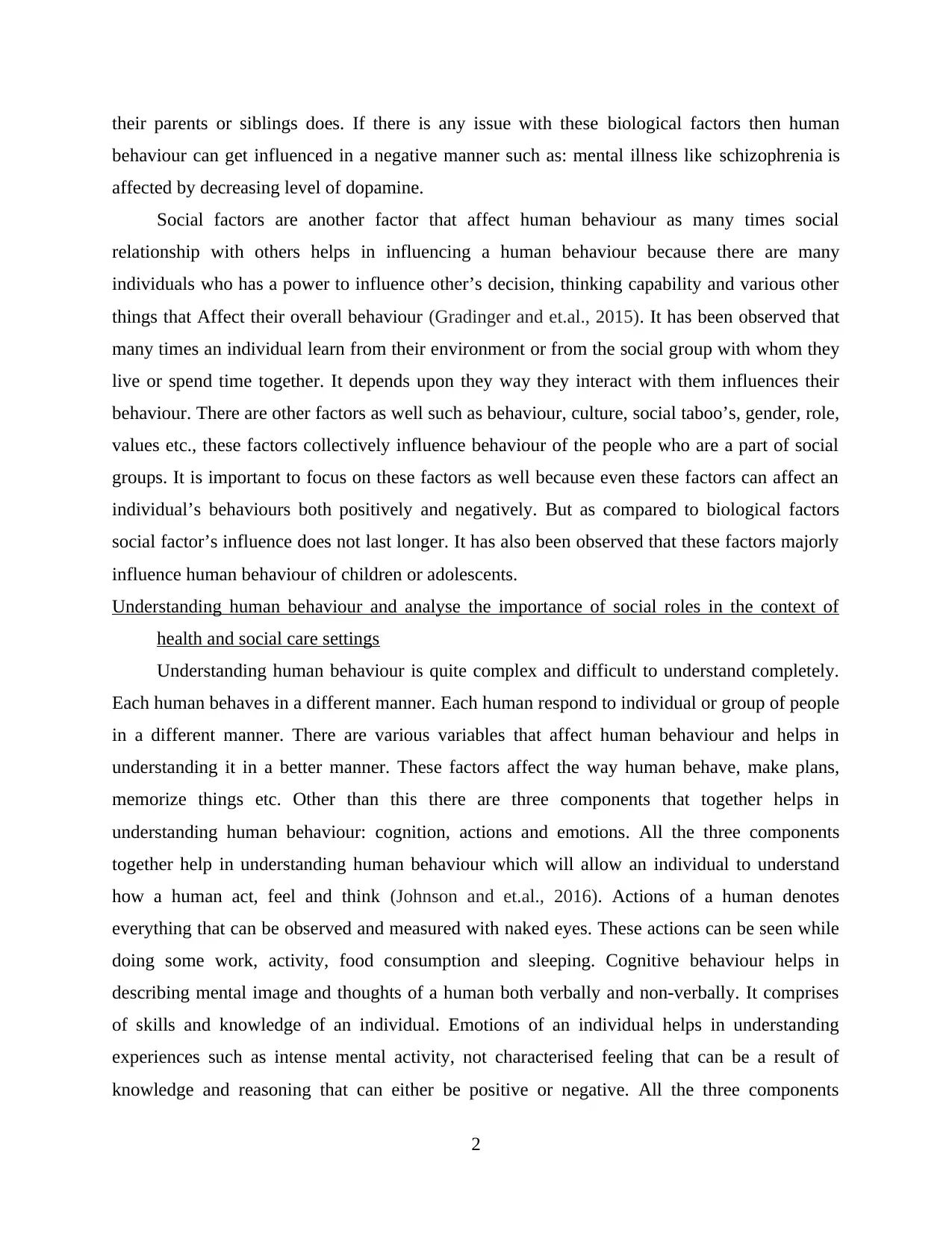
their parents or siblings does. If there is any issue with these biological factors then human
behaviour can get influenced in a negative manner such as: mental illness like schizophrenia is
affected by decreasing level of dopamine.
Social factors are another factor that affect human behaviour as many times social
relationship with others helps in influencing a human behaviour because there are many
individuals who has a power to influence other’s decision, thinking capability and various other
things that Affect their overall behaviour (Gradinger and et.al., 2015). It has been observed that
many times an individual learn from their environment or from the social group with whom they
live or spend time together. It depends upon they way they interact with them influences their
behaviour. There are other factors as well such as behaviour, culture, social taboo’s, gender, role,
values etc., these factors collectively influence behaviour of the people who are a part of social
groups. It is important to focus on these factors as well because even these factors can affect an
individual’s behaviours both positively and negatively. But as compared to biological factors
social factor’s influence does not last longer. It has also been observed that these factors majorly
influence human behaviour of children or adolescents.
Understanding human behaviour and analyse the importance of social roles in the context of
health and social care settings
Understanding human behaviour is quite complex and difficult to understand completely.
Each human behaves in a different manner. Each human respond to individual or group of people
in a different manner. There are various variables that affect human behaviour and helps in
understanding it in a better manner. These factors affect the way human behave, make plans,
memorize things etc. Other than this there are three components that together helps in
understanding human behaviour: cognition, actions and emotions. All the three components
together help in understanding human behaviour which will allow an individual to understand
how a human act, feel and think (Johnson and et.al., 2016). Actions of a human denotes
everything that can be observed and measured with naked eyes. These actions can be seen while
doing some work, activity, food consumption and sleeping. Cognitive behaviour helps in
describing mental image and thoughts of a human both verbally and non-verbally. It comprises
of skills and knowledge of an individual. Emotions of an individual helps in understanding
experiences such as intense mental activity, not characterised feeling that can be a result of
knowledge and reasoning that can either be positive or negative. All the three components
2
behaviour can get influenced in a negative manner such as: mental illness like schizophrenia is
affected by decreasing level of dopamine.
Social factors are another factor that affect human behaviour as many times social
relationship with others helps in influencing a human behaviour because there are many
individuals who has a power to influence other’s decision, thinking capability and various other
things that Affect their overall behaviour (Gradinger and et.al., 2015). It has been observed that
many times an individual learn from their environment or from the social group with whom they
live or spend time together. It depends upon they way they interact with them influences their
behaviour. There are other factors as well such as behaviour, culture, social taboo’s, gender, role,
values etc., these factors collectively influence behaviour of the people who are a part of social
groups. It is important to focus on these factors as well because even these factors can affect an
individual’s behaviours both positively and negatively. But as compared to biological factors
social factor’s influence does not last longer. It has also been observed that these factors majorly
influence human behaviour of children or adolescents.
Understanding human behaviour and analyse the importance of social roles in the context of
health and social care settings
Understanding human behaviour is quite complex and difficult to understand completely.
Each human behaves in a different manner. Each human respond to individual or group of people
in a different manner. There are various variables that affect human behaviour and helps in
understanding it in a better manner. These factors affect the way human behave, make plans,
memorize things etc. Other than this there are three components that together helps in
understanding human behaviour: cognition, actions and emotions. All the three components
together help in understanding human behaviour which will allow an individual to understand
how a human act, feel and think (Johnson and et.al., 2016). Actions of a human denotes
everything that can be observed and measured with naked eyes. These actions can be seen while
doing some work, activity, food consumption and sleeping. Cognitive behaviour helps in
describing mental image and thoughts of a human both verbally and non-verbally. It comprises
of skills and knowledge of an individual. Emotions of an individual helps in understanding
experiences such as intense mental activity, not characterised feeling that can be a result of
knowledge and reasoning that can either be positive or negative. All the three components
2
Paraphrase This Document
Need a fresh take? Get an instant paraphrase of this document with our AI Paraphraser
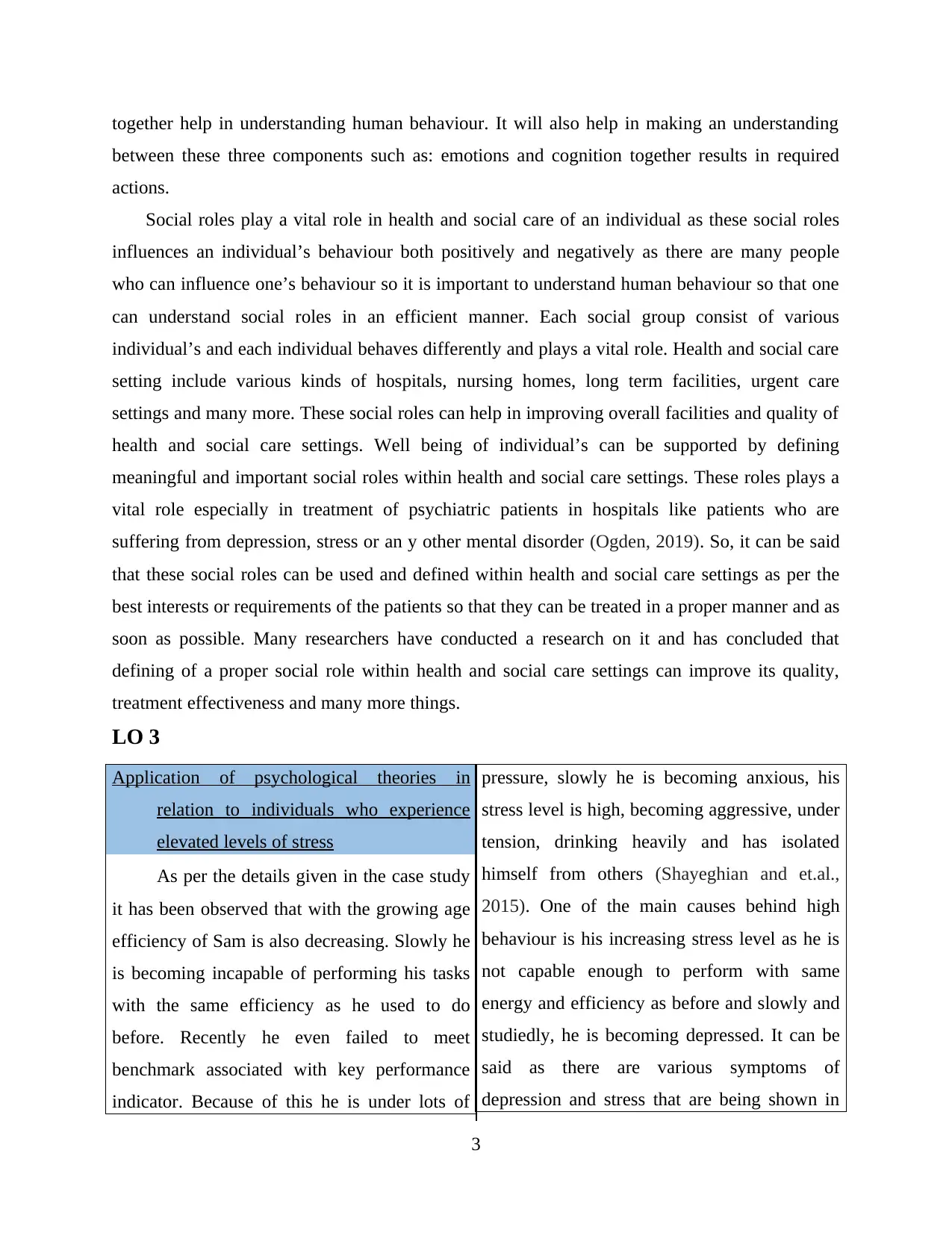
together help in understanding human behaviour. It will also help in making an understanding
between these three components such as: emotions and cognition together results in required
actions.
Social roles play a vital role in health and social care of an individual as these social roles
influences an individual’s behaviour both positively and negatively as there are many people
who can influence one’s behaviour so it is important to understand human behaviour so that one
can understand social roles in an efficient manner. Each social group consist of various
individual’s and each individual behaves differently and plays a vital role. Health and social care
setting include various kinds of hospitals, nursing homes, long term facilities, urgent care
settings and many more. These social roles can help in improving overall facilities and quality of
health and social care settings. Well being of individual’s can be supported by defining
meaningful and important social roles within health and social care settings. These roles plays a
vital role especially in treatment of psychiatric patients in hospitals like patients who are
suffering from depression, stress or an y other mental disorder (Ogden, 2019). So, it can be said
that these social roles can be used and defined within health and social care settings as per the
best interests or requirements of the patients so that they can be treated in a proper manner and as
soon as possible. Many researchers have conducted a research on it and has concluded that
defining of a proper social role within health and social care settings can improve its quality,
treatment effectiveness and many more things.
LO 3
Application of psychological theories in
relation to individuals who experience
elevated levels of stress
As per the details given in the case study
it has been observed that with the growing age
efficiency of Sam is also decreasing. Slowly he
is becoming incapable of performing his tasks
with the same efficiency as he used to do
before. Recently he even failed to meet
benchmark associated with key performance
indicator. Because of this he is under lots of
pressure, slowly he is becoming anxious, his
stress level is high, becoming aggressive, under
tension, drinking heavily and has isolated
himself from others (Shayeghian and et.al.,
2015). One of the main causes behind high
behaviour is his increasing stress level as he is
not capable enough to perform with same
energy and efficiency as before and slowly and
studiedly, he is becoming depressed. It can be
said as there are various symptoms of
depression and stress that are being shown in
3
between these three components such as: emotions and cognition together results in required
actions.
Social roles play a vital role in health and social care of an individual as these social roles
influences an individual’s behaviour both positively and negatively as there are many people
who can influence one’s behaviour so it is important to understand human behaviour so that one
can understand social roles in an efficient manner. Each social group consist of various
individual’s and each individual behaves differently and plays a vital role. Health and social care
setting include various kinds of hospitals, nursing homes, long term facilities, urgent care
settings and many more. These social roles can help in improving overall facilities and quality of
health and social care settings. Well being of individual’s can be supported by defining
meaningful and important social roles within health and social care settings. These roles plays a
vital role especially in treatment of psychiatric patients in hospitals like patients who are
suffering from depression, stress or an y other mental disorder (Ogden, 2019). So, it can be said
that these social roles can be used and defined within health and social care settings as per the
best interests or requirements of the patients so that they can be treated in a proper manner and as
soon as possible. Many researchers have conducted a research on it and has concluded that
defining of a proper social role within health and social care settings can improve its quality,
treatment effectiveness and many more things.
LO 3
Application of psychological theories in
relation to individuals who experience
elevated levels of stress
As per the details given in the case study
it has been observed that with the growing age
efficiency of Sam is also decreasing. Slowly he
is becoming incapable of performing his tasks
with the same efficiency as he used to do
before. Recently he even failed to meet
benchmark associated with key performance
indicator. Because of this he is under lots of
pressure, slowly he is becoming anxious, his
stress level is high, becoming aggressive, under
tension, drinking heavily and has isolated
himself from others (Shayeghian and et.al.,
2015). One of the main causes behind high
behaviour is his increasing stress level as he is
not capable enough to perform with same
energy and efficiency as before and slowly and
studiedly, he is becoming depressed. It can be
said as there are various symptoms of
depression and stress that are being shown in
3
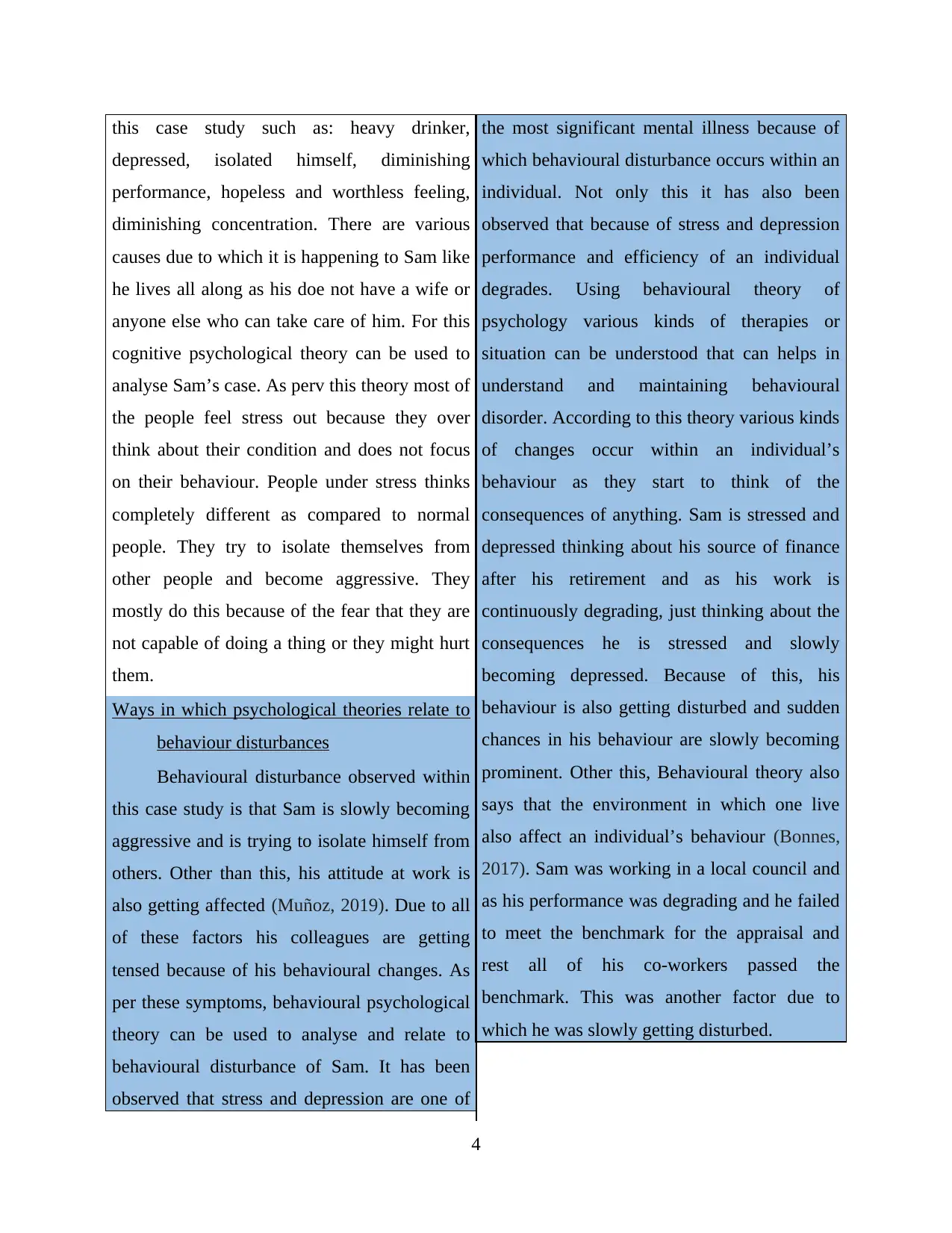
this case study such as: heavy drinker,
depressed, isolated himself, diminishing
performance, hopeless and worthless feeling,
diminishing concentration. There are various
causes due to which it is happening to Sam like
he lives all along as his doe not have a wife or
anyone else who can take care of him. For this
cognitive psychological theory can be used to
analyse Sam’s case. As perv this theory most of
the people feel stress out because they over
think about their condition and does not focus
on their behaviour. People under stress thinks
completely different as compared to normal
people. They try to isolate themselves from
other people and become aggressive. They
mostly do this because of the fear that they are
not capable of doing a thing or they might hurt
them.
Ways in which psychological theories relate to
behaviour disturbances
Behavioural disturbance observed within
this case study is that Sam is slowly becoming
aggressive and is trying to isolate himself from
others. Other than this, his attitude at work is
also getting affected (Muñoz, 2019). Due to all
of these factors his colleagues are getting
tensed because of his behavioural changes. As
per these symptoms, behavioural psychological
theory can be used to analyse and relate to
behavioural disturbance of Sam. It has been
observed that stress and depression are one of
the most significant mental illness because of
which behavioural disturbance occurs within an
individual. Not only this it has also been
observed that because of stress and depression
performance and efficiency of an individual
degrades. Using behavioural theory of
psychology various kinds of therapies or
situation can be understood that can helps in
understand and maintaining behavioural
disorder. According to this theory various kinds
of changes occur within an individual’s
behaviour as they start to think of the
consequences of anything. Sam is stressed and
depressed thinking about his source of finance
after his retirement and as his work is
continuously degrading, just thinking about the
consequences he is stressed and slowly
becoming depressed. Because of this, his
behaviour is also getting disturbed and sudden
chances in his behaviour are slowly becoming
prominent. Other this, Behavioural theory also
says that the environment in which one live
also affect an individual’s behaviour (Bonnes,
2017). Sam was working in a local council and
as his performance was degrading and he failed
to meet the benchmark for the appraisal and
rest all of his co-workers passed the
benchmark. This was another factor due to
which he was slowly getting disturbed.
4
depressed, isolated himself, diminishing
performance, hopeless and worthless feeling,
diminishing concentration. There are various
causes due to which it is happening to Sam like
he lives all along as his doe not have a wife or
anyone else who can take care of him. For this
cognitive psychological theory can be used to
analyse Sam’s case. As perv this theory most of
the people feel stress out because they over
think about their condition and does not focus
on their behaviour. People under stress thinks
completely different as compared to normal
people. They try to isolate themselves from
other people and become aggressive. They
mostly do this because of the fear that they are
not capable of doing a thing or they might hurt
them.
Ways in which psychological theories relate to
behaviour disturbances
Behavioural disturbance observed within
this case study is that Sam is slowly becoming
aggressive and is trying to isolate himself from
others. Other than this, his attitude at work is
also getting affected (Muñoz, 2019). Due to all
of these factors his colleagues are getting
tensed because of his behavioural changes. As
per these symptoms, behavioural psychological
theory can be used to analyse and relate to
behavioural disturbance of Sam. It has been
observed that stress and depression are one of
the most significant mental illness because of
which behavioural disturbance occurs within an
individual. Not only this it has also been
observed that because of stress and depression
performance and efficiency of an individual
degrades. Using behavioural theory of
psychology various kinds of therapies or
situation can be understood that can helps in
understand and maintaining behavioural
disorder. According to this theory various kinds
of changes occur within an individual’s
behaviour as they start to think of the
consequences of anything. Sam is stressed and
depressed thinking about his source of finance
after his retirement and as his work is
continuously degrading, just thinking about the
consequences he is stressed and slowly
becoming depressed. Because of this, his
behaviour is also getting disturbed and sudden
chances in his behaviour are slowly becoming
prominent. Other this, Behavioural theory also
says that the environment in which one live
also affect an individual’s behaviour (Bonnes,
2017). Sam was working in a local council and
as his performance was degrading and he failed
to meet the benchmark for the appraisal and
rest all of his co-workers passed the
benchmark. This was another factor due to
which he was slowly getting disturbed.
4
⊘ This is a preview!⊘
Do you want full access?
Subscribe today to unlock all pages.

Trusted by 1+ million students worldwide
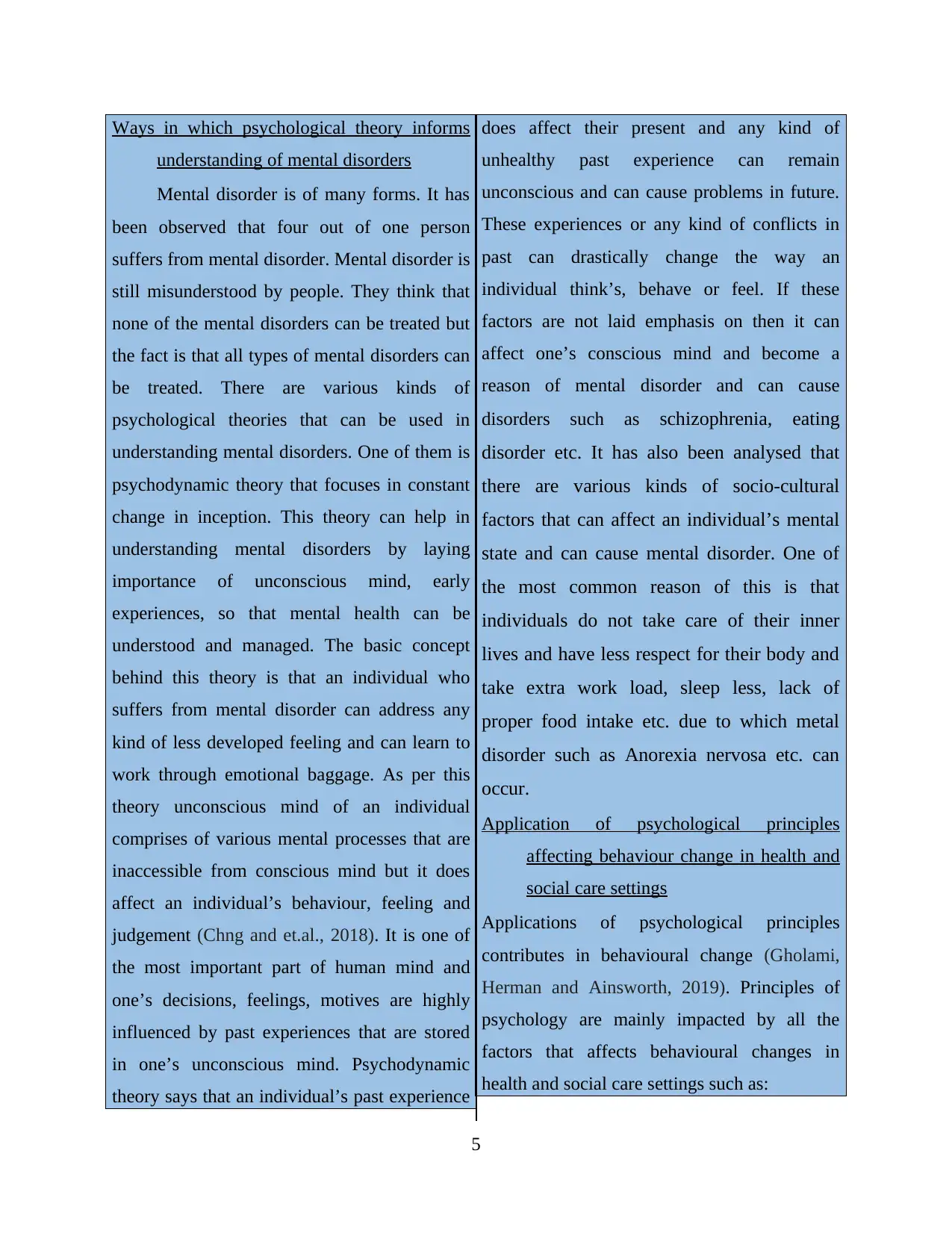
Ways in which psychological theory informs
understanding of mental disorders
Mental disorder is of many forms. It has
been observed that four out of one person
suffers from mental disorder. Mental disorder is
still misunderstood by people. They think that
none of the mental disorders can be treated but
the fact is that all types of mental disorders can
be treated. There are various kinds of
psychological theories that can be used in
understanding mental disorders. One of them is
psychodynamic theory that focuses in constant
change in inception. This theory can help in
understanding mental disorders by laying
importance of unconscious mind, early
experiences, so that mental health can be
understood and managed. The basic concept
behind this theory is that an individual who
suffers from mental disorder can address any
kind of less developed feeling and can learn to
work through emotional baggage. As per this
theory unconscious mind of an individual
comprises of various mental processes that are
inaccessible from conscious mind but it does
affect an individual’s behaviour, feeling and
judgement (Chng and et.al., 2018). It is one of
the most important part of human mind and
one’s decisions, feelings, motives are highly
influenced by past experiences that are stored
in one’s unconscious mind. Psychodynamic
theory says that an individual’s past experience
does affect their present and any kind of
unhealthy past experience can remain
unconscious and can cause problems in future.
These experiences or any kind of conflicts in
past can drastically change the way an
individual think’s, behave or feel. If these
factors are not laid emphasis on then it can
affect one’s conscious mind and become a
reason of mental disorder and can cause
disorders such as schizophrenia, eating
disorder etc. It has also been analysed that
there are various kinds of socio-cultural
factors that can affect an individual’s mental
state and can cause mental disorder. One of
the most common reason of this is that
individuals do not take care of their inner
lives and have less respect for their body and
take extra work load, sleep less, lack of
proper food intake etc. due to which metal
disorder such as Anorexia nervosa etc. can
occur.
Application of psychological principles
affecting behaviour change in health and
social care settings
Applications of psychological principles
contributes in behavioural change (Gholami,
Herman and Ainsworth, 2019). Principles of
psychology are mainly impacted by all the
factors that affects behavioural changes in
health and social care settings such as:
5
understanding of mental disorders
Mental disorder is of many forms. It has
been observed that four out of one person
suffers from mental disorder. Mental disorder is
still misunderstood by people. They think that
none of the mental disorders can be treated but
the fact is that all types of mental disorders can
be treated. There are various kinds of
psychological theories that can be used in
understanding mental disorders. One of them is
psychodynamic theory that focuses in constant
change in inception. This theory can help in
understanding mental disorders by laying
importance of unconscious mind, early
experiences, so that mental health can be
understood and managed. The basic concept
behind this theory is that an individual who
suffers from mental disorder can address any
kind of less developed feeling and can learn to
work through emotional baggage. As per this
theory unconscious mind of an individual
comprises of various mental processes that are
inaccessible from conscious mind but it does
affect an individual’s behaviour, feeling and
judgement (Chng and et.al., 2018). It is one of
the most important part of human mind and
one’s decisions, feelings, motives are highly
influenced by past experiences that are stored
in one’s unconscious mind. Psychodynamic
theory says that an individual’s past experience
does affect their present and any kind of
unhealthy past experience can remain
unconscious and can cause problems in future.
These experiences or any kind of conflicts in
past can drastically change the way an
individual think’s, behave or feel. If these
factors are not laid emphasis on then it can
affect one’s conscious mind and become a
reason of mental disorder and can cause
disorders such as schizophrenia, eating
disorder etc. It has also been analysed that
there are various kinds of socio-cultural
factors that can affect an individual’s mental
state and can cause mental disorder. One of
the most common reason of this is that
individuals do not take care of their inner
lives and have less respect for their body and
take extra work load, sleep less, lack of
proper food intake etc. due to which metal
disorder such as Anorexia nervosa etc. can
occur.
Application of psychological principles
affecting behaviour change in health and
social care settings
Applications of psychological principles
contributes in behavioural change (Gholami,
Herman and Ainsworth, 2019). Principles of
psychology are mainly impacted by all the
factors that affects behavioural changes in
health and social care settings such as:
5
Paraphrase This Document
Need a fresh take? Get an instant paraphrase of this document with our AI Paraphraser
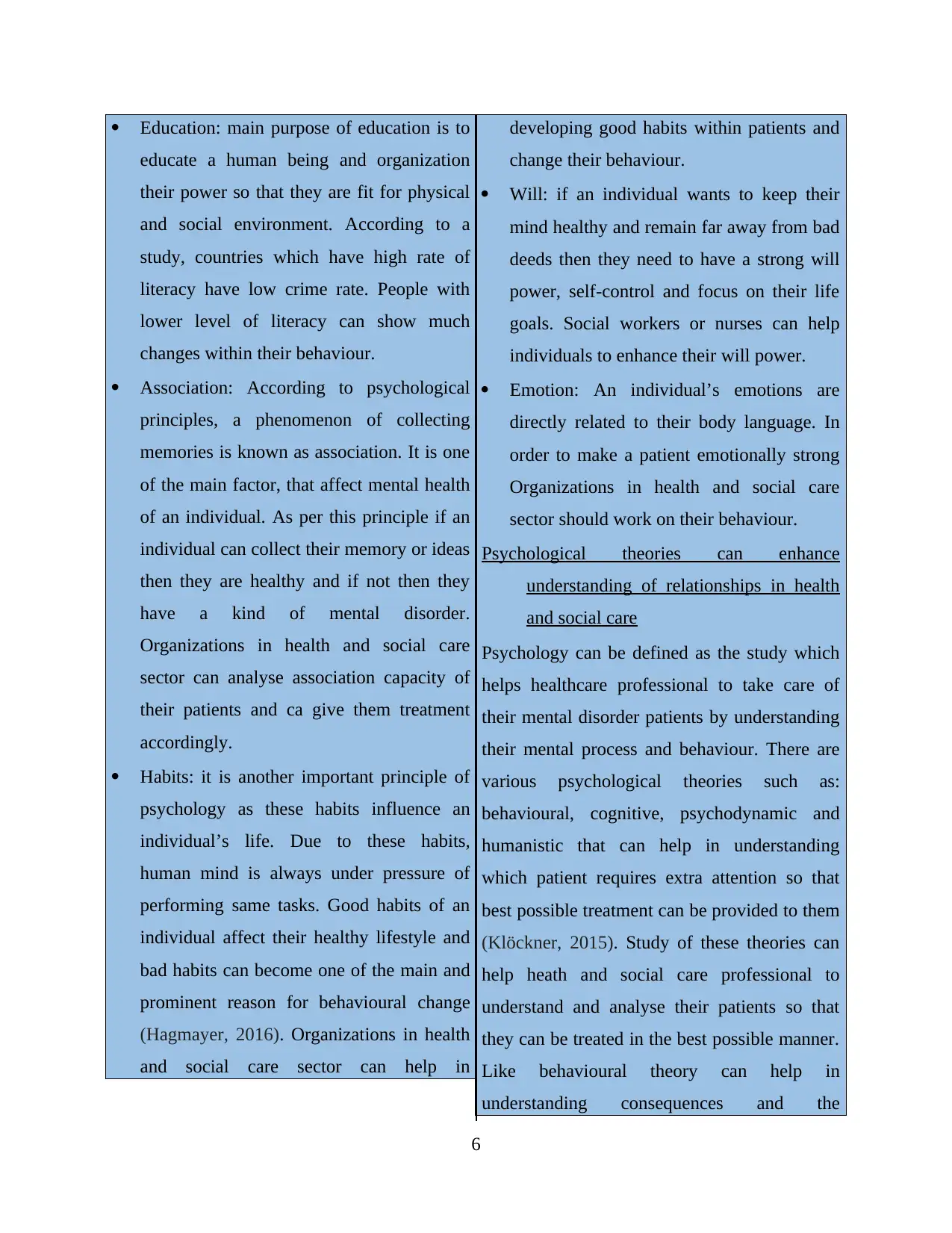
Education: main purpose of education is to
educate a human being and organization
their power so that they are fit for physical
and social environment. According to a
study, countries which have high rate of
literacy have low crime rate. People with
lower level of literacy can show much
changes within their behaviour.
Association: According to psychological
principles, a phenomenon of collecting
memories is known as association. It is one
of the main factor, that affect mental health
of an individual. As per this principle if an
individual can collect their memory or ideas
then they are healthy and if not then they
have a kind of mental disorder.
Organizations in health and social care
sector can analyse association capacity of
their patients and ca give them treatment
accordingly.
Habits: it is another important principle of
psychology as these habits influence an
individual’s life. Due to these habits,
human mind is always under pressure of
performing same tasks. Good habits of an
individual affect their healthy lifestyle and
bad habits can become one of the main and
prominent reason for behavioural change
(Hagmayer, 2016). Organizations in health
and social care sector can help in
developing good habits within patients and
change their behaviour.
Will: if an individual wants to keep their
mind healthy and remain far away from bad
deeds then they need to have a strong will
power, self-control and focus on their life
goals. Social workers or nurses can help
individuals to enhance their will power.
Emotion: An individual’s emotions are
directly related to their body language. In
order to make a patient emotionally strong
Organizations in health and social care
sector should work on their behaviour.
Psychological theories can enhance
understanding of relationships in health
and social care
Psychology can be defined as the study which
helps healthcare professional to take care of
their mental disorder patients by understanding
their mental process and behaviour. There are
various psychological theories such as:
behavioural, cognitive, psychodynamic and
humanistic that can help in understanding
which patient requires extra attention so that
best possible treatment can be provided to them
(Klöckner, 2015). Study of these theories can
help heath and social care professional to
understand and analyse their patients so that
they can be treated in the best possible manner.
Like behavioural theory can help in
understanding consequences and the
6
educate a human being and organization
their power so that they are fit for physical
and social environment. According to a
study, countries which have high rate of
literacy have low crime rate. People with
lower level of literacy can show much
changes within their behaviour.
Association: According to psychological
principles, a phenomenon of collecting
memories is known as association. It is one
of the main factor, that affect mental health
of an individual. As per this principle if an
individual can collect their memory or ideas
then they are healthy and if not then they
have a kind of mental disorder.
Organizations in health and social care
sector can analyse association capacity of
their patients and ca give them treatment
accordingly.
Habits: it is another important principle of
psychology as these habits influence an
individual’s life. Due to these habits,
human mind is always under pressure of
performing same tasks. Good habits of an
individual affect their healthy lifestyle and
bad habits can become one of the main and
prominent reason for behavioural change
(Hagmayer, 2016). Organizations in health
and social care sector can help in
developing good habits within patients and
change their behaviour.
Will: if an individual wants to keep their
mind healthy and remain far away from bad
deeds then they need to have a strong will
power, self-control and focus on their life
goals. Social workers or nurses can help
individuals to enhance their will power.
Emotion: An individual’s emotions are
directly related to their body language. In
order to make a patient emotionally strong
Organizations in health and social care
sector should work on their behaviour.
Psychological theories can enhance
understanding of relationships in health
and social care
Psychology can be defined as the study which
helps healthcare professional to take care of
their mental disorder patients by understanding
their mental process and behaviour. There are
various psychological theories such as:
behavioural, cognitive, psychodynamic and
humanistic that can help in understanding
which patient requires extra attention so that
best possible treatment can be provided to them
(Klöckner, 2015). Study of these theories can
help heath and social care professional to
understand and analyse their patients so that
they can be treated in the best possible manner.
Like behavioural theory can help in
understanding consequences and the
6
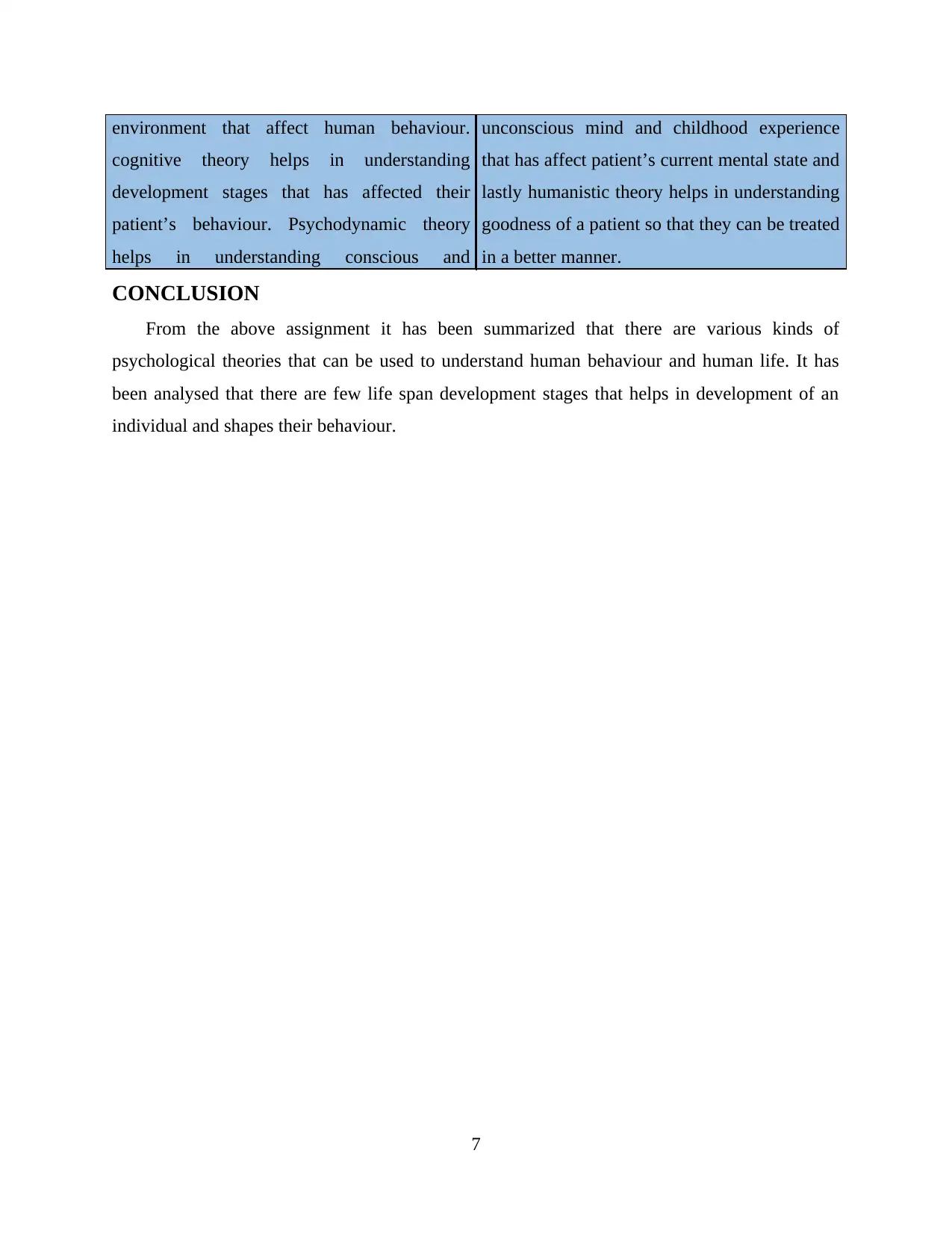
environment that affect human behaviour.
cognitive theory helps in understanding
development stages that has affected their
patient’s behaviour. Psychodynamic theory
helps in understanding conscious and
unconscious mind and childhood experience
that has affect patient’s current mental state and
lastly humanistic theory helps in understanding
goodness of a patient so that they can be treated
in a better manner.
CONCLUSION
From the above assignment it has been summarized that there are various kinds of
psychological theories that can be used to understand human behaviour and human life. It has
been analysed that there are few life span development stages that helps in development of an
individual and shapes their behaviour.
7
cognitive theory helps in understanding
development stages that has affected their
patient’s behaviour. Psychodynamic theory
helps in understanding conscious and
unconscious mind and childhood experience
that has affect patient’s current mental state and
lastly humanistic theory helps in understanding
goodness of a patient so that they can be treated
in a better manner.
CONCLUSION
From the above assignment it has been summarized that there are various kinds of
psychological theories that can be used to understand human behaviour and human life. It has
been analysed that there are few life span development stages that helps in development of an
individual and shapes their behaviour.
7
⊘ This is a preview!⊘
Do you want full access?
Subscribe today to unlock all pages.

Trusted by 1+ million students worldwide
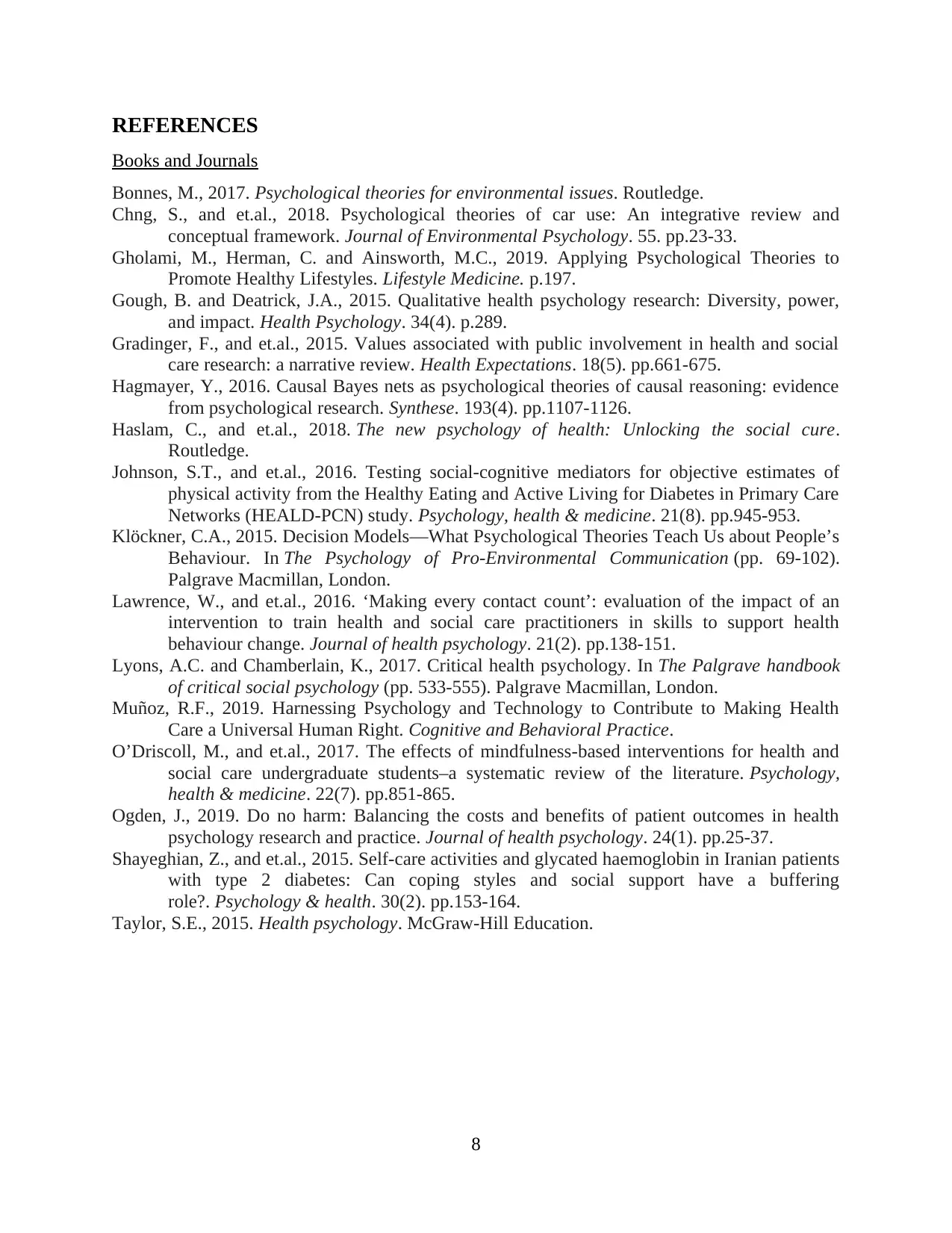
REFERENCES
Books and Journals
Bonnes, M., 2017. Psychological theories for environmental issues. Routledge.
Chng, S., and et.al., 2018. Psychological theories of car use: An integrative review and
conceptual framework. Journal of Environmental Psychology. 55. pp.23-33.
Gholami, M., Herman, C. and Ainsworth, M.C., 2019. Applying Psychological Theories to
Promote Healthy Lifestyles. Lifestyle Medicine. p.197.
Gough, B. and Deatrick, J.A., 2015. Qualitative health psychology research: Diversity, power,
and impact. Health Psychology. 34(4). p.289.
Gradinger, F., and et.al., 2015. Values associated with public involvement in health and social
care research: a narrative review. Health Expectations. 18(5). pp.661-675.
Hagmayer, Y., 2016. Causal Bayes nets as psychological theories of causal reasoning: evidence
from psychological research. Synthese. 193(4). pp.1107-1126.
Haslam, C., and et.al., 2018. The new psychology of health: Unlocking the social cure.
Routledge.
Johnson, S.T., and et.al., 2016. Testing social-cognitive mediators for objective estimates of
physical activity from the Healthy Eating and Active Living for Diabetes in Primary Care
Networks (HEALD-PCN) study. Psychology, health & medicine. 21(8). pp.945-953.
Klöckner, C.A., 2015. Decision Models—What Psychological Theories Teach Us about People’s
Behaviour. In The Psychology of Pro-Environmental Communication (pp. 69-102).
Palgrave Macmillan, London.
Lawrence, W., and et.al., 2016. ‘Making every contact count’: evaluation of the impact of an
intervention to train health and social care practitioners in skills to support health
behaviour change. Journal of health psychology. 21(2). pp.138-151.
Lyons, A.C. and Chamberlain, K., 2017. Critical health psychology. In The Palgrave handbook
of critical social psychology (pp. 533-555). Palgrave Macmillan, London.
Muñoz, R.F., 2019. Harnessing Psychology and Technology to Contribute to Making Health
Care a Universal Human Right. Cognitive and Behavioral Practice.
O’Driscoll, M., and et.al., 2017. The effects of mindfulness-based interventions for health and
social care undergraduate students–a systematic review of the literature. Psychology,
health & medicine. 22(7). pp.851-865.
Ogden, J., 2019. Do no harm: Balancing the costs and benefits of patient outcomes in health
psychology research and practice. Journal of health psychology. 24(1). pp.25-37.
Shayeghian, Z., and et.al., 2015. Self-care activities and glycated haemoglobin in Iranian patients
with type 2 diabetes: Can coping styles and social support have a buffering
role?. Psychology & health. 30(2). pp.153-164.
Taylor, S.E., 2015. Health psychology. McGraw-Hill Education.
8
Books and Journals
Bonnes, M., 2017. Psychological theories for environmental issues. Routledge.
Chng, S., and et.al., 2018. Psychological theories of car use: An integrative review and
conceptual framework. Journal of Environmental Psychology. 55. pp.23-33.
Gholami, M., Herman, C. and Ainsworth, M.C., 2019. Applying Psychological Theories to
Promote Healthy Lifestyles. Lifestyle Medicine. p.197.
Gough, B. and Deatrick, J.A., 2015. Qualitative health psychology research: Diversity, power,
and impact. Health Psychology. 34(4). p.289.
Gradinger, F., and et.al., 2015. Values associated with public involvement in health and social
care research: a narrative review. Health Expectations. 18(5). pp.661-675.
Hagmayer, Y., 2016. Causal Bayes nets as psychological theories of causal reasoning: evidence
from psychological research. Synthese. 193(4). pp.1107-1126.
Haslam, C., and et.al., 2018. The new psychology of health: Unlocking the social cure.
Routledge.
Johnson, S.T., and et.al., 2016. Testing social-cognitive mediators for objective estimates of
physical activity from the Healthy Eating and Active Living for Diabetes in Primary Care
Networks (HEALD-PCN) study. Psychology, health & medicine. 21(8). pp.945-953.
Klöckner, C.A., 2015. Decision Models—What Psychological Theories Teach Us about People’s
Behaviour. In The Psychology of Pro-Environmental Communication (pp. 69-102).
Palgrave Macmillan, London.
Lawrence, W., and et.al., 2016. ‘Making every contact count’: evaluation of the impact of an
intervention to train health and social care practitioners in skills to support health
behaviour change. Journal of health psychology. 21(2). pp.138-151.
Lyons, A.C. and Chamberlain, K., 2017. Critical health psychology. In The Palgrave handbook
of critical social psychology (pp. 533-555). Palgrave Macmillan, London.
Muñoz, R.F., 2019. Harnessing Psychology and Technology to Contribute to Making Health
Care a Universal Human Right. Cognitive and Behavioral Practice.
O’Driscoll, M., and et.al., 2017. The effects of mindfulness-based interventions for health and
social care undergraduate students–a systematic review of the literature. Psychology,
health & medicine. 22(7). pp.851-865.
Ogden, J., 2019. Do no harm: Balancing the costs and benefits of patient outcomes in health
psychology research and practice. Journal of health psychology. 24(1). pp.25-37.
Shayeghian, Z., and et.al., 2015. Self-care activities and glycated haemoglobin in Iranian patients
with type 2 diabetes: Can coping styles and social support have a buffering
role?. Psychology & health. 30(2). pp.153-164.
Taylor, S.E., 2015. Health psychology. McGraw-Hill Education.
8
1 out of 10
Related Documents
Your All-in-One AI-Powered Toolkit for Academic Success.
+13062052269
info@desklib.com
Available 24*7 on WhatsApp / Email
![[object Object]](/_next/static/media/star-bottom.7253800d.svg)
Unlock your academic potential
Copyright © 2020–2026 A2Z Services. All Rights Reserved. Developed and managed by ZUCOL.





